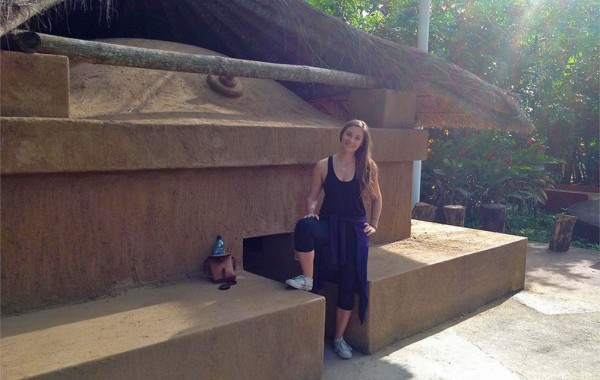Hannah Robinson ’11
While investigating human rights cases in Guatemala for the past year, attorney Hannah Robinson ’11 felt somewhat safe as an American citizen — but she did “get nervous every time a motorcycle pulled up next to [her].” With good reason: 26 legal professionals have been murdered there since 2013; the most recent was in June by gunmen on motorbikes.
The Scene first Skyped with Robinson in January, the midpoint of her year in Guatemala, where she was building cases involving genocide crimes. Robinson is supported by a fellowship through Loyola Law School, from which she graduated last spring. She was the first from Loyola to pursue this work — it was her idea and design.
From the summer of 2014 until this summer, Robinson worked under the Human Rights Office of the Archbishop of Guatemala, writing genocide indictments against the former government. More than 200,000 Guatemalans were murdered and disappeared during the 1960 to 1996 civil war, which peaked in the early ’80s under former dictator Ríos Montt. He has been in the headlines recently because he and other senior officials were found guilty in 2013, but the verdict was overturned based on a technicality.
Robinson’s team has been working with other human rights groups to bring cases against additional former government officials. “Because I was the person in the office with the most training in international law and the only one whose mother tongue is English, that put me in the position where, as a first-year attorney, I wrote the indictments,” she said.
In addition to those criminal cases, Robinson has been building another case independently. She’s creating an alien tort statute case, “which is basically getting civil damages for victims of human rights abuses in U.S. courts,” Robinson explained. “It’s called the alien tort statute because noncitizens are the petitioners seeking relief.”
This case is on behalf of the Ixil Mayans, to get compensation for them because they “were promised reconciliation from the government when the peace accords were signed in 1996, but it just hasn’t happened,” Robinson said.
Whom she’s attempting to sue, Robinson can’t fully disclose. She is willing to say that the party is a well-known American public figure who donated money to support the genocide cause in the ’80s.
Part of her research included interviewing Guatemalan citizens, which was tricky because she couldn’t be forthright with her sources, either. In addition to not wanting to tip her hand, Robinson must be mindful of her personal safety. “You have to be aware that you’re suing for genocide, which is such a drastic thing that they’re probably going to take whatever measures they can to protect themselves or destroy evidence,” Robinson said. “So I have to be guarded.”
When she’s finished her research, Robinson hopes to find support from a law firm willing to back the alien tort case.
Robinson left Guatemala at the end of the summer, amidst a tumultuous political landscape. She’s now safely in Los Angeles, working with Loyola’s Center for the Study of Law and Genocide for the second year of her fellowship. With the help of students there, she’ll continue writing the genocide indictments for the Office of the Archbishop of Guatemala.
In addition, Robinson will be conducting genocide research for the Extraordinary Chambers in the Courts of Cambodia with law students in Loyola’s International Human Rights Clinic.
“These people deserve justice,” she said in answer to why she’s motivated to pursue this weighty work. “They deserve their story to be told, and it’s not being told very extensively on the international scale. If we don’t do something, there’s a good chance nobody will.”
— Aleta Mayne







